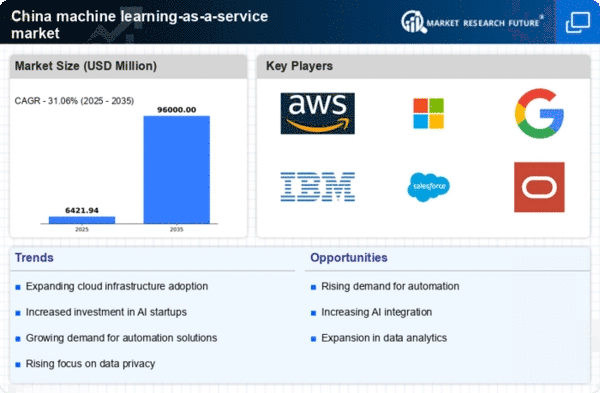Increased Focus on Automation
this market is witnessing a heightened focus on automation across various industries in China. As companies strive to enhance productivity and reduce operational costs, the integration of machine learning solutions for automating processes has become increasingly prevalent. In 2025, it is projected that automation technologies will account for approximately 25% of total IT spending in the manufacturing sector alone. This trend is indicative of a broader shift towards intelligent automation, where machine learning algorithms are employed to optimize workflows and improve efficiency. Consequently, the demand for machine learning-as-a-service offerings is likely to rise, as organizations seek to implement automated solutions that can adapt and learn from data over time. This focus on automation not only streamlines operations but also positions businesses to respond more effectively to market changes.
Rising Demand for Data Analytics
The machine learning-as-a-service market in China is experiencing a notable surge in demand for data analytics solutions. As businesses increasingly recognize the value of data-driven decision-making, the need for advanced analytics tools has escalated. In 2025, the market is projected to grow at a compound annual growth rate (CAGR) of approximately 30%, driven by sectors such as finance, healthcare, and retail. Companies are seeking to leverage machine learning capabilities to extract insights from vast datasets, thereby enhancing operational efficiency and customer engagement. This trend indicates a shift towards a more data-centric approach, where organizations prioritize analytics to remain competitive. Consequently, the machine learning-as-a-service market is positioned to benefit significantly from this growing demand, as it provides scalable and accessible solutions for businesses of all sizes.
Government Initiatives and Support
The Chinese government is actively promoting the adoption of artificial intelligence and machine learning technologies, which is positively impacting the machine learning-as-a-service market. Various initiatives, such as funding programs and policy frameworks, are designed to encourage innovation and investment in AI. In 2025, government spending on AI-related projects is expected to exceed $10 billion, reflecting a commitment to establishing China as a leader in AI technology. This support not only fosters research and development but also creates a conducive environment for startups and established companies to explore machine learning solutions. As a result, the machine learning-as-a-service market is likely to see increased participation from both public and private sectors, driving growth and innovation in the industry.
Expansion of Internet Infrastructure
The rapid expansion of internet infrastructure in China is a critical driver for the machine learning-as-a-service market. With the increasing availability of high-speed internet and improved connectivity, businesses are more inclined to adopt cloud-based machine learning solutions. As of 2025, it is estimated that over 70% of enterprises in urban areas have access to reliable internet services, facilitating the deployment of machine learning applications. This enhanced connectivity allows organizations to process and analyze data in real-time, leading to more informed decision-making. Furthermore, the proliferation of IoT devices contributes to the generation of vast amounts of data, which can be harnessed through machine learning services. Thus, the growth of internet infrastructure is likely to propel the machine learning-as-a-service market forward, enabling broader access to advanced analytics capabilities.
Growing Interest in Predictive Analytics
There is a growing interest in predictive analytics within the machine learning-as-a-service market in China. Organizations are increasingly leveraging predictive models to forecast trends, customer behavior, and market dynamics. By 2025, it is anticipated that the predictive analytics segment will represent a substantial portion of the overall machine learning market, driven by sectors such as e-commerce, finance, and healthcare. Companies are recognizing the potential of machine learning to enhance their forecasting capabilities, leading to more strategic decision-making. This trend suggests that businesses are not only looking to analyze historical data but are also keen on utilizing machine learning to anticipate future outcomes. As a result, the machine learning-as-a-service market is likely to expand, providing tools and platforms that facilitate predictive analytics for a diverse range of applications.
















